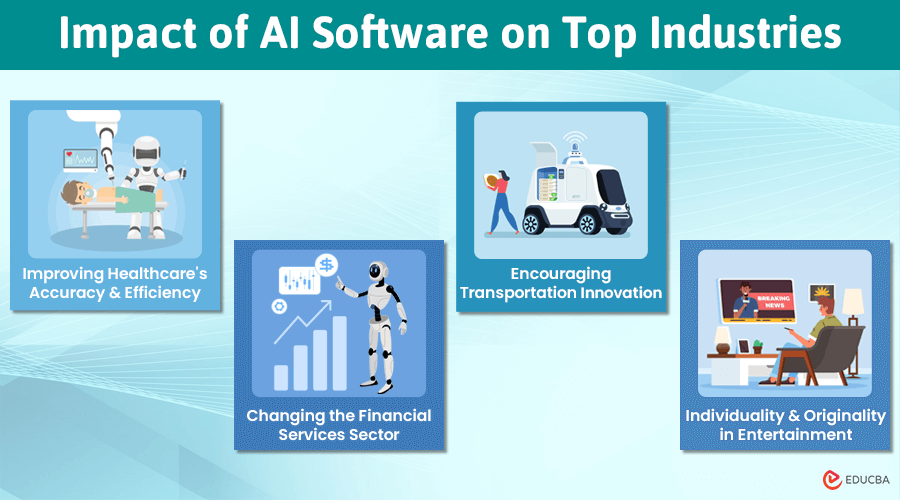
What is the Impact of AI Software on Top Industries?
AI software enables computers to perform tasks that require human intelligence, such as learning, perception, problem-solving, understanding insights, and language comprehension. Top industries are using the best AI software so that they can analyze sophisticated data to make immediate decisions. It also helps them protect their data and maintain data privacy and security. Let us look at what is the impact of AI software on top industries.
1. Improving Healthcare’s Accuracy and Efficiency
AI revolutionizes healthcare by enhancing drug discovery methods, personalized treatments, and diagnostic accuracy. AI systems examine extensive datasets to identify patterns and make accurate predictions. For example, Google’s DeepMind can detect complex diseases from medical images, significantly improving prevention and therapy. However, addressing validation, regulatory compliance, and data privacy issues is essential for widespread adoption.
2. Changing the Financial Services Sector
AI has transformed banking with improvements in fraud detection, automation, and personalized customer experiences. Machine learning algorithms excel in detecting and preventing fraud compared to traditional methods, and AI-powered chatbots deliver immediate customer support. Businesses using AI in finance aim to increase efficiency, optimize decision-making, and enhance security. However, to build trust and ensure the ethical use of AI in banking, it is essential to manage concerns about algorithmic bias, transparency, and regulatory oversight.
3. Encouraging Transportation Innovation
AI optimizes routes, operates autonomous vehicles, and performs predictive maintenance in transportation. Companies like Waymo and Tesla promise increased mobility, reduced road congestion, and fewer accidents. AI enhances supply chain management and logistics, leading to faster deliveries and reduced environmental impact. However, addressing public trust, safety standards, and technological challenges is essential for achieving widespread adoption of autonomous vehicles, alongside considering ethical implications regarding AI-driven decisions in transportation.
4. Individuality and Originality in Entertainment
AI has impacted entertainment through personalized campaigns and recommendations, automated content creation, and imaginative storytelling. Streaming platforms use AI algorithms to understand user preferences and deliver tailored experiences, increasing engagement. AI-generated literature, visual art, and music redefine artistic express0ion and push creative boundaries. However, balancing AI’s creative potential with concerns about human creativity, legal issues, and copyright remains challenging in the entertainment industry.
Final Thoughts
While AI captures headlines for its potential to transform industries and raise ethical questions, its current impact is already clear. From improving healthcare to enhancing safety, AI continues to drive technological progress and streamline operations across different sectors. Balancing AI’s promises with ethical considerations will be crucial as we move forward. This balance is necessary to harness its full potential for everyone’s benefit.
Recommended Articles
If this article was informative in helping you learn about the impact of AI software on top industries, you can explore the articles below for additional insights.


